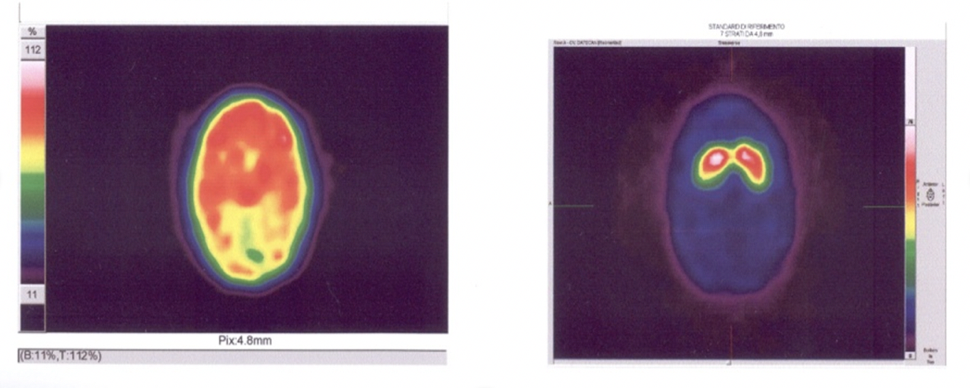Session Information
Date: Monday, September 23, 2019
Session Title: Rare Genetic and Metabolic Diseases
Session Time: 1:45pm-3:15pm
Location: Les Muses Terrace, Level 3
Objective: To provide evidence of digenic inheritance in infantile parkinsonism.
Background: Oligogenic inheritance has been demonstrated in PD[1],where patients with a primary genetic cause can have additional variants acting as modifying genetic factors. This polygenic architecture, particularly relevant for early onset forms[2],has never been reported in infantile parkinsonism.
Method: A trio based whole exome sequencing (WES) analysis was followed by functional validation of WARS2 and CHRNA6 variants.
Results: An 11 years old male presented at the age of 10 months with progressive parkinsonism (rest and action tremor, axial hypotonia, hypo/bradykinesia, dystonia). CSF examination disclosed low homovanillic acid and levodopa/carbidopa was started. The initial honeymoon period was followed by increasingly severe motor fluctuations that eventually led to the need for levodopa-carbidopa intestinal gel at the age of 7. DaTSCAN was confirmatory, showing a complete derangement of dopaminergic (DA) striatal pathways [figure 1].WES analysis identified compound heterozygosity for two missense mutations (p.Trp13Gly and p.Met227Val) in the WARS2 gene, encoding the mitochondrial tryptophanyl tRNA synthetase (mtTrpRS). WARS2 has recently been associated with intellectual disability, mitochondrial encephalopathy and, in a single case, infantile parkinsonism [3]. Western blotting analysis demonstrated a dramatic reduction of mtTrpRS level and OXPHOS status evaluation suggested mild but significant defects of the respiratory chain complexes, confirming the pathogenicity of the WARS2 mutations.Based on the very early age of onset and the particularly severe phenotype of our patient, we hypothesized a possible contribution of a second hit in a different gene.In line with this hypothesis,WES analysis identified a de novo mutation (c.526T>C; p.Phe176Ser) in CHRNA6, encoding the α6 subunit of nicotinic receptors, which plays a key role in the cholinergic modulation of dopamine release in DA neurons.In silico modeling predicted a disrupting effect of the mutation on the allosteric transition mediating channel opening and receptor assembly. The mutation strongly impaired receptor function in Xenopus oocytes, GH4C1 cells, and C. elegans neuromuscular junction.
Conclusion: These findings confirmed the role of WARS2 in the pathogenesis of infantile parkinsonism, and strongly suggested that defective CHRNA6 function could worsen the WARS2-associated phenotype.
References: [1] Lubbe, S. J., Escott-Price, V., Gibbs, J. R., Nalls, M. A., Bras, J., Price, T. R., … & Tomkins, J. E. (2016). Additional rare variant analysis in Parkinson’s disease cases with and without known pathogenic mutations: evidence for oligogenic inheritance. Human molecular genetics, 25(24), 5483-5489. [2] Escott‐Price, V., International Parkinson’s Disease Genomics Consortium, Nalls, M. A., Morris, H. R., Lubbe, S., Brice, A., … & Singleton, A. B. (2015). Polygenic risk of P arkinson disease is correlated with disease age at onset. Annals of neurology, 77(4), 582-591. [3] Burke, E. A., Frucht, S. J., Thompson, K., Wolfe, L. A., Yokoyama, T., Bertoni, M., … & Gahl, W. A. (2018). Biallelic mutations in mitochondrial tryptophanyl‐tRNA synthetase cause Levodopa‐responsive infantile‐onset Parkinsonism. Clinical genetics, 93(3), 712-718.
To cite this abstract in AMA style:
S. Galosi, S. Martinelli, V. Cordeddu, S. Fucile, C. Limatola, R. Carrozzo, M. Tartaglia, V. Leuzzi. Digenic inheritance of WARS2 and CHRNA6 mutations in infantile parkinsonism [abstract]. Mov Disord. 2019; 34 (suppl 2). https://www.mdsabstracts.org/abstract/digenic-inheritance-of-wars2-and-chrna6-mutations-in-infantile-parkinsonism/. Accessed January 7, 2026.« Back to 2019 International Congress
MDS Abstracts - https://www.mdsabstracts.org/abstract/digenic-inheritance-of-wars2-and-chrna6-mutations-in-infantile-parkinsonism/

